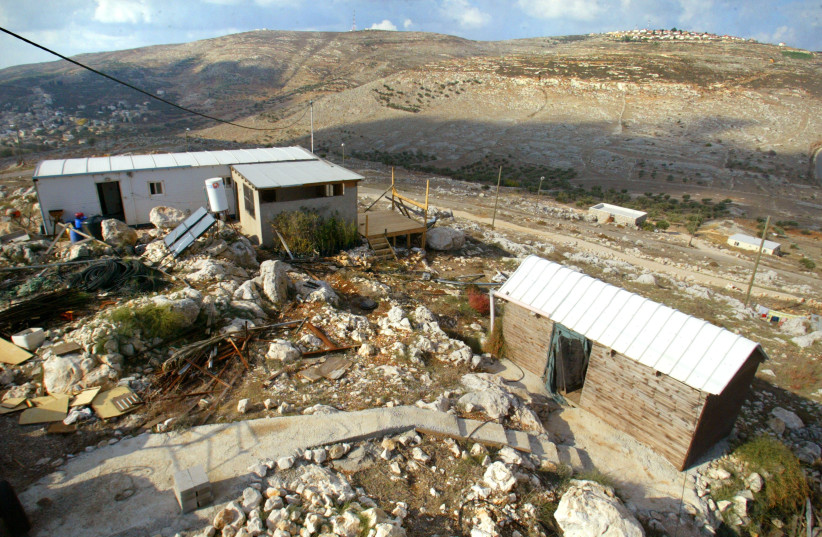A grassroots plan for an Israeli-Palestinian confederation to resolve the conflict that would allow settlers to remain in their homes, is expected to be handed to the United Nations and the Biden administration this week by former justice minister Yossi Beilin.
“It would be easier to co-operate and coordinate if the framework is a confederation, rather than a two-state solution,” said Beilin, who is a former Meretz Party leader.
Beilin co-authored his plan with Palestinian attorney and former peace negotiator Hiba Husseini, along with a small group of Israelis and Palestinians.
They have put forward their plan at a time when the peace process is frozen, the Biden administration refrained from initiating talks and Prime Minister Naftali Bennett has publicly stated that he does not support a Palestinian state.
“We have a prime minister that does not believe in the two-state solution, who doesn’t believe in partition,” Beilin said, adding, however, that this “doesn’t mean we shouldn’t raise the issue today.”

Beilin said he hoped the plan, two years in the making, would prompt international debate on resolutions to the conflict.
As to the question of whether members of this government had seen the plan, he said, it “would not surprise them.”
The plan uses a European Union-style model to link two ethnic nationalist states, an Israeli and a Palestinian one.
Each nation would maintain its individual statehood but operate under an additional layer of cooperative infrastructure that would bind the two peoples together, rather than seek to divide them.
Among the confederation plan’s unique features is an option for settlers to remain in the West Bank as residents, not citizens, within the final boundaries of a Palestinian state, Beilin explained. In exchange an equal number of Palestinians would be granted residency within Israel, he added.
One of the main challenges for any Israeli leader seeking a deal with the Palestinians, is the issue of uprooting settlements, Beilin said.
“Any potential prime minister is worried about confrontation with the settlers and an evacuation [of settlers],” Beilin said.
Under this plan, “the Israeli future decision-maker will not have to deal with the evacuation of any [single] Israeli from the territories,’ Beilin said.
In both cases, residency would not be a track for citizenship, Beilin said. Nor is the option connected to the issue of a right of return for Palestinian refugees, he said.
Among those slated to receive the plan are; UN Secretary-General Antonio Guterres, US Deputy Secretary of State Wendy Sherman and the nominee for Assistant Secretary of State for Near Eastern Affairs Barbara Leaf.
Beilin was instrumental in both the creation of the Oslo Accords in 1993 and the grassroots Geneva Initiative in 2003.
Beilin’s plan is not formally part of the Geneva Initiative or the NGO that works to preserve that option.
But the Geneva Initiative, with a border based on the pre-1967 lines with mutually agreed land swaps, is a pillar of Berlin’s plan.
“We just built another floor on the Geneva Initiative,” he said.
Adherents of the two-state solution, in the aftermath of the failed Oslo negotiations, have erred in focusing on the need to separate Israelis and Palestinians. “It was a huge mistake that contributed to fear and hatred,” he said.
Complete separation is “not a very attractive” resolution to the conflict, Beilin said.
Already in articles Beilin wrote in The New York Times in 2015 and for The Jerusalem Post in 2019, he put forward this idea of an Israeli-Palestinian confederation.
The plan opens with a joint narrative rather than a dual-narrative of the Israeli-Palestinian conflict, that predates the creation of the state and goes back to biblical times.
“I think it is a historic precedent” to have such a narrative, Beilin said. “To the best of my knowledge, nothing like that was ever done.”
In the past, he explained, “we were always afraid to touch such a sensitive issue, believing it was “impossible to write a narrative together” given that it was “sad, very problematic: and involved “a tough competition between victims,” Beilin said.
Yet, he said, “we did it here.”
It was the framework of a confederation that made it possible, he said. It gave Israelis and Palestinians an “umbrella” that allowed “us to go into the very sensitive nerves of history.”
The plan also suggests “some practical idea to heal the wounds,” Beilin added.
Beilin and Husseini started this latest initiative during the election process two years ago, when Likud leader Benjamin Netanyahu was the prime minister and the annexation drive was gaining steam.
Beilin has been driven in part to resolve the conflict out of a desire to ensure, he said, “that Israel remains a democratic Jewish state... the demographic story is knocking on our door all the time.”
Israel would take action to resolve the conflict, he said, when there “is an Israeli leader who understands that we are on the verge of becoming a Jewish minority ruling a Palestinian majority.”
He hopes, he said, that this plan will play a part in prompting Israeli leaders to seek a resolution to the conflict. He recalled the Geneva Initiative was created at a time when the peace process was frozen. Former Prime Minister Ariel Sharon was “up in arms” about it and “called us traitors.”
Then, after a short while, he raised the issue of the unilateral withdrawal from Gaza through the Disengagement Plan, Beilin recalled. In another interview with the Times in 2004, Sharon was asked about his decision to destroy settlements in Gaza. He said he was worried that the “bad solutions” like the Geneva Initiative will capture the heart of Israelis.
“Sometimes you do something like that and you do not know what will be the ramifications. If the current government is trying to find another solution, because it does not want ours, I will not cry,” Beilin said.
